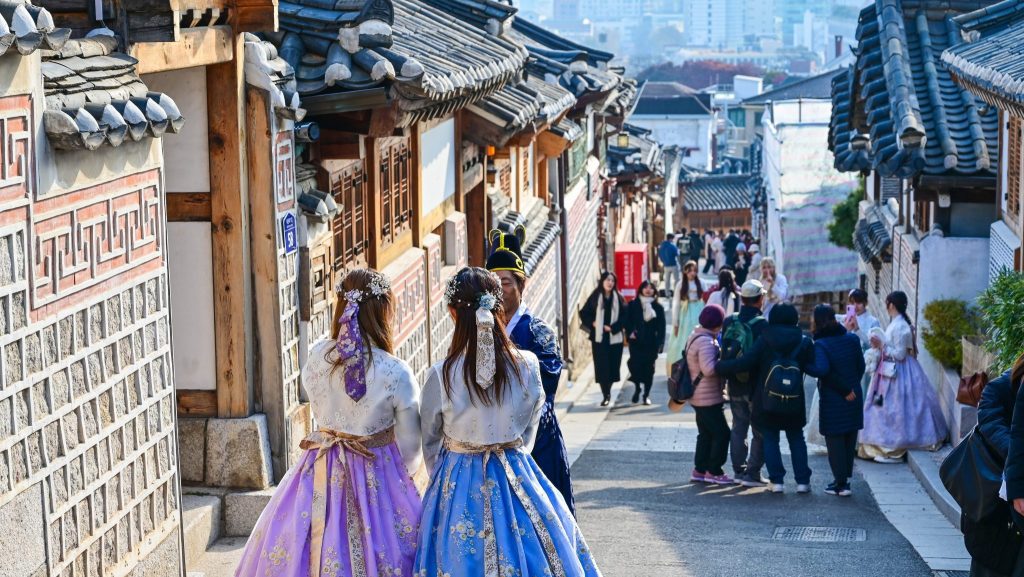~Tips for Overcoming Language Anxiety~
When planning a trip to Korea, many people may feel anxious about language, thinking, “Is it okay if I can’t speak Korean?”, “Do I need English?”, or “Can I get by with just Japanese?”
In fact, for first-time travelers or those who don’t know Korean, the language barrier can be a major concern. In this article, we’ll explain in detail what kind of language issues you might actually encounter in Korea and whether it’s possible to travel using only Japanese.
The extent to which language is understood in Korea varies depending on the location.
Korean is the primary language used throughout the country, but in tourist areas or certain stores, you may also find people who can communicate in English or Japanese.

Places Where Japanese Is More Likely to Be Understood:
- Myeongdong
- Dongdaemun
- Namdaemun
- Insadong
- Airports and major hotels
These areas are popular with Japanese tourists, so some staff may speak Japanese. You’ll often see Japanese signs or phrases like “Welcome” (어서 오세요) and “Thank you” (감사합니다).
Places Where Japanese Is Less Likely to Be Understood:
- Local restaurants and markets
- Smaller cities outside major hubs like Busan
- Local buses or train station information desks
In these places, you may need to rely on Korean or at least basic English. However, translation apps are usually sufficient to communicate effectively.
Is It Helpful to Know English?
English can be understood to some extent by younger Koreans, hotel staff, and airport employees. However, taxi drivers or older people may not speak English.
Therefore, relying solely on English can feel a bit risky. Still, knowing a few basic words or using a translation app is usually enough to handle most situations.
Real-Life Language Issues and How to Solve Them
Here are some episodes experienced by Japanese travelers and their solutions:
Case ①: Can’t Read the Menu at a Local Restaurant
→ Solution: Use menus with photos or a translation app
Nowadays, more restaurants have menus with pictures. You can also use the camera function in Google Translate to capture the menu and understand the general meaning.
Case ②: Taxi Driver Doesn’t Understand the Destination
→ Solution: Show the destination written in Korean
Save the name of your destination in Korean on your smartphone and show it to the driver. This usually ensures a smooth ride.
Case ③: Lost and English Doesn’t Work
→ Solution: Use a map app and gestures
Many Koreans are friendly and willing to help. If you show gestures or a map, they will often guide you in the right direction.

Useful Tools for Traveling in Korea
Even if you don’t speak Korean, having the following tools prepared can help you travel with confidence:
1. Google Translate
Supports Korean⇔Japanese voice translation and camera translation. It’s recommended to download offline functions in advance.
2. NAVER Papago
A Korean-made translation app with high accuracy for Korean. It is especially popular among travelers in Korea.
3. KakaoMap / NAVER Map
More reliable than Google Maps for local information, and public transportation guidance is easier to understand.
4. Memorize Basic Korean Phrases
- こんにちは: 안녕하세요 (Annyeonghaseyo) – Hello
- ありがとう: 감사합니다 (Kamsahamnida) – Thank you
- ○○はどこですか?: ○○ 어디예요? (○○ Eodi-eyo?) – Where is ○○?
Even If Words Don’t Work, Hearts Can Connect

In Korea, many people are kind and helpful to Japanese travelers, even if you can’t communicate fluently. For example, if you look confused, someone might approach you to help or even use a translation app together.
Although language anxiety is natural, a smile and polite attitude often encourages people to reach out and offer assistance.
Summary: You Can Enjoy Traveling in Korea Using Only Japanese!
In short, it is entirely possible to travel in Korea using just Japanese. Japanese is understood to some extent in tourist areas, and in places where it isn’t, translation apps or gestures can solve most communication issues.
Of course, memorizing a few basic Korean greetings or expressions of thanks can make interactions with locals even more enjoyable.
Don’t be afraid of language barriers—enjoy your trip to Korea freely and without stress!
Table of Contents









